Untitled
0.0(0)
0.0(0)
Card Sorting
1/74
Earn XP
Description and Tags
Study Analytics
Name | Mastery | Learn | Test | Matching | Spaced | Call with Kai |
|---|
No study sessions yet.
75 Terms
1
New cards
Latin
The language of Ancient Rome
2
New cards
peninsula
land surrounded by water on three sides
3
New cards
Roman Senate
a council of wealthy and powerful Romans that advised the city's leaders. Served for life
4
New cards
Consuls
the two most powerful officials in Rome
5
New cards
Tribunes
official who was elected by the plebeians to protect their interests. Had the power to veto
6
New cards
New Testament
the second part of the bible; it tells you about the life and teachings of Jesus and about his followers
7
New cards
republic
A form of government in which citizens choose their leaders by voting
8
New cards
Forum
Rome's public meeting place
9
New cards
Jesus of Nazareth
his life and sermons form the basis for Chritianity
10
New cards
Republic
a form of government in which citizens elect representatives to speak or act for them.
11
New cards
Senate
A powerful, ruling body of 300 Roman patricians who served a life-term.
12
New cards
Consuls
a set of two officials of Rome who commanded the army and government. Elected by the Roman Senate, only ruled for one year, and could overrule/veto each other.
13
New cards
Legion
A military unit of the ancient Roman army, made up of about 5,000 foot soldiers and a group of soldiers on horseback.
14
New cards
Romulus and Remus
Traditional story of how Rome began. Twins abandoned and rescued by a wolf, raised by a shepherd. Grew to build Rome.
15
New cards
Plebians
Members of the lower class of Ancient Rome including small farmers, merchants, artisans and traders.
16
New cards
Twelve Tables
The earliest written collection of Roman laws, drawn up by patricians about 450 B.C. that became the foundation of Roman law.
17
New cards
Triumverate
government of ancient Rome ruled equally by three people.
18
New cards
Julius Caesar
A successful Roman general and famous speaker, was governer of Gaul, used army to expand control of Roman Republic, eventually becoming a "dictator for life".
19
New cards
Caesar
A title used by all Roman emperors. When a New Testament writer mentions "Caesar," he means the emperor who was ruling at the time.
20
New cards
Octavian Augustus
Roman statesman who established the Roman Empire and became emperor in 27 BC.
21
New cards
Colosseum
Ancient Roman arena known for its tremendous architecture and bloody entertainment
22
New cards
Pompeii
Roman city near Naples, Italy, which was buried during an eruption of Mount Vesuvius in A.D. 79.
23
New cards
Augustus
Imperial title meaning "majestic or exalted one", given to Octavian from the Senate marking the founding of the Empire of Rome.
24
New cards
Marcus Aurelias
Brought the empire to the height of economic prosperity and defeated invaders, also wrote philosophy. Last Caesar of the Pax Romana era.
25
New cards
Tiberius
Son-in-law of Augustus who became a suspicious tyrannical Emperor of Rome after a brilliant military career (42 BC to AD 37)
26
New cards
Vespasian
Emperor of Rome and founder of the Flavian dynasty who consolidated Roman rule in Germany and Britain and reformed the army and brought prosperity to the empire
27
New cards
Diocletian
Emperor of Rome (284-305) who divided the empire into east and west (286) in an attempt to rule the territory more effectively. His desire to revive the old religion of Rome led to the last major persecution of the Christians (303).
28
New cards
Constantine
Roman Emperor (4th century A.D.) who promoted tolerance to all religions in the Roman Empire and legalized Christianity
29
New cards
Latins
The local people who first lived in the area of Rome.
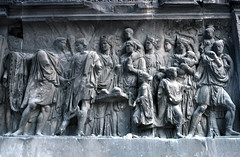
30
New cards
Etruscans
Beginning in the 700s BCE, first rulers of Roman Republic and Empire; Laid the foundation for Rome and Roman civilization. Skilled metal workers. Built up Rome, streets, temples. Ruled early Rome until 509 BC

31
New cards
Sicily
the largest island in the Mediterranean, near the "toe" of Italy.
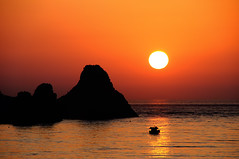
32
New cards
Apennines
a mountain range that extends through Italy from north to south
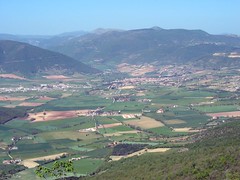
33
New cards
Carthage
an ancient city state on the north African coast; enemy of Rome in Punic Wars
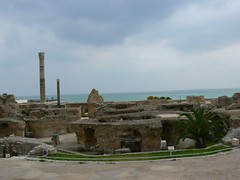
34
New cards
Zama
Battle where Scipio defeated Carthage in 202 B.C. during Punic Wars.
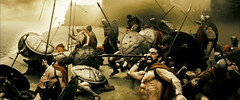
35
New cards
Hannibal
General of Carthage who marched his army from Spain to Rome in Second Punic War
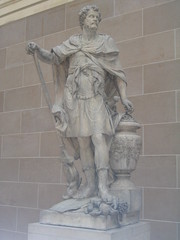
36
New cards
patrician
In ancient Rome, a member of the wealthy, privileged upper class
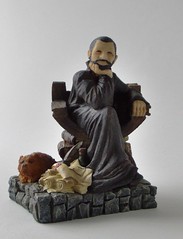
37
New cards
plebian
in ancient Rome, one of the common farmers, artisans, and merchants who made up most of the population
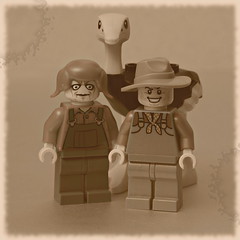
38
New cards
consul
one of two elected officials of the Roman Republic who commanded the army and ran the governmentengrad
39
New cards
praetor
important government offical in ancient Rome; interpretted the law and acted as judge
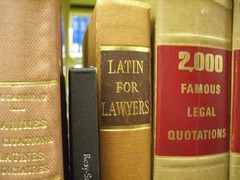
40
New cards
dictator
In ancient Rome, a political leader given absolute power to make laws and command the army for a limited time.
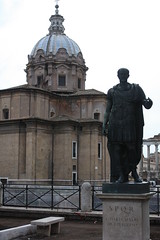
41
New cards
triumvirate
In ancient Rome, a group of three leaders sharing control of the government.
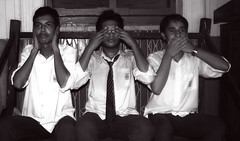
42
New cards
Rubicon
a small river which Julius Caesar crossed on his march into Italy that began a civil war
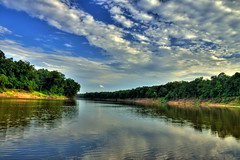
43
New cards
Actium
The battle in 31 BC where Octavian crushed Antony and Cleopatra and took over the Roman empire
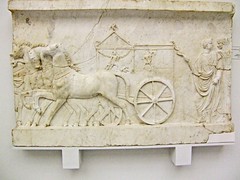
44
New cards
Octavian
Julius Caesar's grandnephew, later known as Augustus. By defeating Mark Antony, he gained rule of all roman lands. He was Rome's first true emperor.
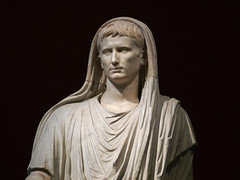
45
New cards
Antony
Caesar's ally and assistant; later allied with Egyptian queen Cleopatra VIII; both were defeated by Octavian and committed suicide
46
New cards
Pax Romana
means "Roman Peace;" refers to the 200 years of peace and stability that Rome maintained within its borders during the early empire, lasting from 27 B.C. to A.D. 180.
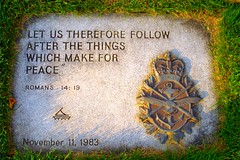
47
New cards
Caligula
A cruel and insane ruler of the Roman Empire in the first century A.D.; one of the twelve Caesars. To humiliate the senators of Rome, he appointed his horse to the senate. His given name was Gaius Julius Caesar.
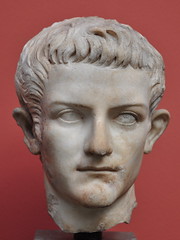
48
New cards
Nero
Last of the Julio Claudian emperors, Murdered his mother, Blamed Christians for fire in Rome. "fiddled while Rome burned." The Empire remained prosperous during his rule (37-68)
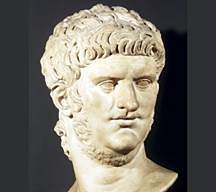
49
New cards
aqueduct
in ancient Rome, bridgelike stone structure that carried water from the hills into the cities
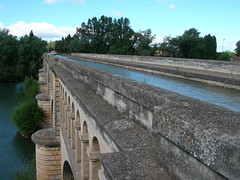
50
New cards
currency
system of money

51
New cards
Rhine River
one river which formed the north eastern border of the Roman empire set by Hadrian
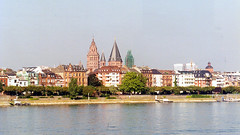
52
New cards
Myth
A traditional story about gods, ancestors, or heroes, told to explain the natural world or the customs and beliefs of a society.
53
New cards
Palatine
One of the seven hills in ancient Rome
54
New cards
Arch
Curved architecture for spanning an opening and supporting the weight above it
55
New cards
Gladiators
Trained fighters, usually slaves, who fought in arenas as entertainment
56
New cards
Greco-Roman Art
having the characteristics of Roman art with a strong Greek influence
57
New cards
Patricians
Powerful wealthy landowners who controlled Roman government and society
58
New cards
Plebeians
Members of the lower class of Ancient Rome including farmers, merchants, artisans and traders
59
New cards
Tribune
In ancient Rome, an official elected by the plebeians to protect their rights
60
New cards
Empire
A group of states or territories controlled by one ruler
61
New cards
Civil War
A war between people of the same country
62
New cards
Punic Wars
A series of three wars between Rome and Carthage (264-146 B.C.); resulted in the destruction of Carthage and Rome's dominance over the western Mediterranean
63
New cards
Christianity
A monotheistic system of beliefs and practices based on the Old Testament and the teachings of Jesus as embodied in the New Testament and emphasizing the role of Jesus as savior
64
New cards
Jesus Christ
A teacher and prophet whose life and teachings form the basis of Christianity. Christians believe Him to be Son of God
65
New cards
Messiah
Hebrew for "anointed." This is used in reference to Jesus because he accomplished perfectly the divine mission of priest, prophet, and king, signified by his being anointed as Christ
66
New cards
Prefect
A chief officer or military governor
67
New cards
Gospels
Four books in the New Testament that tell the story of Christ's life and teachings
68
New cards
Disciples
Followers of Jesus who helped spread his religious teachings
69
New cards
Imperialism
A policy in which a strong nation seeks to establish control over other countries land and people
70
New cards
Census
A periodic and official count of a country's population
71
New cards
Apostles
12 disciples of Jesus, chosen to help Him in his teaching
72
New cards
Martyrs
People who are willing to die for their religous beliefs
73
New cards
Constantinople
A place previously known as Byzantium which became the capitol of the Roman Empire or "new Rome"
74
New cards
Huns
Warlike people who migrated from Eastern Europe into territory controlled by Germanic tribes, forcing them to move into areas controlled by Rome
75
New cards
Mercenary
A soldier who fights for any country or group that will pay him